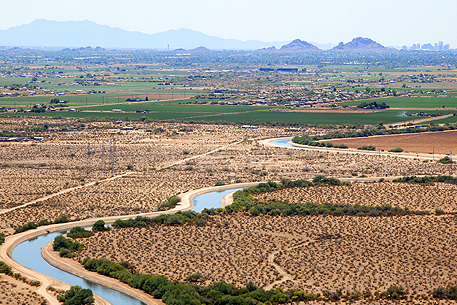ASU, an Innovative Leader in the Environmental Humanities
The Environmental Humanities Initiative (EHI) explores how history, literature, philosophy, religion, anthropology, ethnic studies, film, art, and music each serve as entry points to vibrant discussions exploring the complex relationships between people, place, and planet and how best to support our interconnected flourishing.
 Networked through the Julie Ann Wrigley Global Futures Laboratory (GFL), the EHI seeks to facilitate broad participation of faculty, research scholars, and students from across disciplines and knowledge domains. Affiliates of EHI delve into fundamental questions about what it means to be human amongst other species and consider how we define our obligations to future generations of human and nonhuman life on the planet.
Networked through the Julie Ann Wrigley Global Futures Laboratory (GFL), the EHI seeks to facilitate broad participation of faculty, research scholars, and students from across disciplines and knowledge domains. Affiliates of EHI delve into fundamental questions about what it means to be human amongst other species and consider how we define our obligations to future generations of human and nonhuman life on the planet.
EHI affiliates offer conceptual clarification, theoretical analyses, and critical explorations of who “humans” are, how they live, what motivates them, how they imagine and work for change, respond to risk, live in relationship to the nonhuman, and plan for the future.
Bridging the Gaps between the Humanities, Social Sciences, Sustainability Science and Action while Leveraging Humanities Leadership
The EHI is a proud co-founding partner of the Humanities for the Environment (HfE) Global Network of Observatories, an internationally recognized organization that networks eight Observatories on five continents and over 39 universities around the world. The HfE’s North American Observatory is hosted by the EHI. Most recently, HfE stepped into an even more prominent international role by becoming one of three founding co-partners of BRIDGES, the humanities-led Sustainability Science Coalition of UNESCO’s international science program Management of Social Transformations (MOST). The other founding partners were UNESCO and the International Council for Philosophy and Human Sciences (CIPSH). Together, GFL, HfE and BRIDGES are advancing a highly active national and global network of humanities expertise recognized within the UN, UNESCO, and Future Earth communities, among others.
The BRIDGES Sustainability Science Coalition is a major strategic undertaking in the humanities-inclusive co-design and co-production of research, education and public action in support of the Sustainable Development Goals (SDGs) internationally. Though anchored in the humanities, BRIDGES is designed to go beyond this domain; it is aimed at broadening sustainability science by bringing multiple forms of knowledge, including all academic fields as well as local, traditional and indigenous knowledge, to bear in efforts to meet the challenges of the global sustainability agenda.
History
Arizona State University is a recognized leader of innovation in higher education, and boasts the nation’s first School of Sustainability, housed within the Global Institute of the Sustainability and Innovation. Since the founding of the ASU Wrigley Institute in 2004, the humanities and arts have been recognized as an integral part of the sustainability sciences.
ASU’s Environmental Humanities leadership includes some of the founders of the field doing cutting-edge research. Several recent faculty hires have added some of the brightest new scholars in the field to this already stellar faculty. In education, ASU launched its undergraduate Environmental Humanities Certificate in 2009 and offers a wide range of undergraduate and graduate courses across the disciplines that allow students to explore the full interdisciplinary nature of interlinked social and environmental systems. In outreach, ASU regularly presents speaker series and conference programs that are open to the public.

ASU currently serves as the headquarters of the HfE North American Observatory and of the international Humanities for the Environment (HfE).
See: http://hfe-observatories.org/observatories/north-american-observatory

